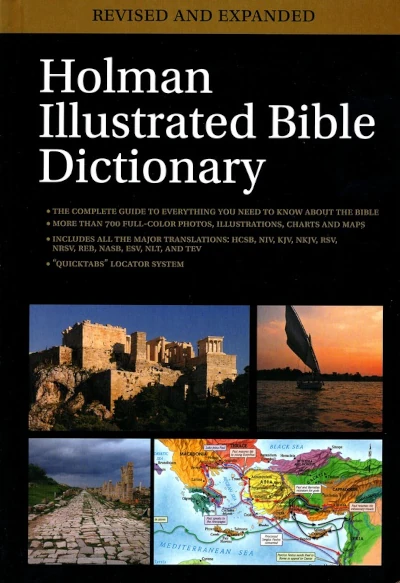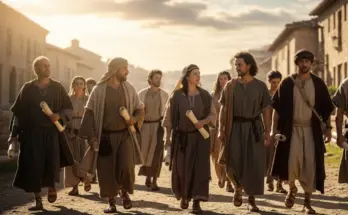Genesis 12 – The Call of Abram
Go from your country and your kindred… and I will make of you a great nation.(Genesis 12:1–2, ESV)
The story of faith begins with Genesis 12, where God calls a man named Abram to step out of everything familiar. This chapter marks a turning point in Scripture, introducing the covenant promise that shapes the entire Bible. Through Abram, later called Abraham, God began His redemptive plan to bless all nations. Genesis 12 teaches us what it means to follow God’s voice when we do not know the full path ahead.

Thompson Chain-Reference Bible
The KJV Thompson Chain-Reference Bible, Handy Size is printed in the KJV Comfort Print® typeface for easy reading. Expertly designed specifically to be used for the King James Version (KJV) text, Comfort Print offers an easier reading experience that complements the translation. Get Yours on Amazon
Abram lived in a world filled with idolatry and uncertainty, yet God saw in him a heart that would trust and obey. When God said, “Go,” Abram did not hesitate. His obedience is one of the clearest examples of faith in action. He left his homeland, his relatives, and his comfort to follow God’s promise of a new land and a new future.
For beginners studying the Bible, Genesis 12 shows that walking with God often means taking steps before we see the full picture. Faith begins when we believe His word is enough to guide us. As we explore this chapter, we see how Abram’s journey reveals both God’s faithfulness and human weakness. It reminds us that obedience opens the door to blessing, even when circumstances seem uncertain.
The Call of Abram (Genesis 12:1–9)
1 Now the Lord said to Abram, “Go from your country and your kindred and your father’s house to the land that I will show you. 2 And I will make of you a great nation, and I will bless you and make your name great, so that you will be a blessing. 3 I will bless those who bless you, and him who dishonors you I will curse, and in you all the families of the earth shall be blessed.” 4 So Abram went, as the Lord had told him, and Lot went with him. Abram was seventy-five years old when he departed from Haran. 5 And Abram took Sarai his wife, and Lot his brother’s son, and all their possessions that they had gathered, and the people that they had acquired in Haran, and they set out to go to the land of Canaan. When they came to the land of Canaan, 6 Abram passed through the land to the place at Shechem, to the oak of Moreh. At that time the Canaanites were in the land. 7 Then the Lord appeared to Abram and said, “To your offspring I will give this land.” So he built there an altar to the Lord, who had appeared to him. 8 From there he moved to the hill country on the east of Bethel and pitched his tent, with Bethel on the west and Ai on the east. And there he built an altar to the Lord and called upon the name of the Lord. 9 And Abram journeyed on, still going toward the Negeb.
Commentary Genesis 12:1-9
God spoke directly to Abram, calling him to leave his country, his family, and his father’s household. The Lord promised to make Abram into a great nation, bless him, and make his name great. This divine call in Genesis 12:1–9 is both a command and a promise. God’s instruction required total trust because Abram did not yet know where he was going. Hebrews 11:8 later says that Abram “went out, not knowing where he was going.”
Abram obeyed, taking his wife Sarai, his nephew Lot, and all their possessions. When they arrived in Canaan, God appeared to Abram again, confirming that He would give this land to his descendants. Abram built altars at Shechem and Bethel, publicly declaring his faith in the one true God. Each altar marked a step of obedience and worship along the way.
Genesis 12 reminds us that God often calls His people to step forward before the details are clear. Faith does not wait for perfect conditions; it trusts in God’s character. Abram’s response shows that true obedience involves both movement and worship. His journey began with a promise and a simple act of trust, setting the foundation for God’s covenant people. Through Abram, the story of redemption began to unfold for all generations.
Abram and Sarai in Egypt (Genesis 12:10–20)
10 Now there was a famine in the land. So Abram went down to Egypt to sojourn there, for the famine was severe in the land. 11 When he was about to enter Egypt, he said to Sarai his wife, “I know that you are a woman beautiful in appearance, 12 and when the Egyptians see you, they will say, ‘This is his wife. ’ Then they will kill me, but they will let you live. 13 Say you are my sister, that it may go well with me because of you, and that my life may be spared for your sake.” 14 When Abram entered Egypt, the Egyptians saw that the woman was very beautiful. 15 And when the princes of Pharaoh saw her, they praised her to Pharaoh. And the woman was taken into Pharaoh’s house. 16 And for her sake he dealt well with Abram; and he had sheep, oxen, male donkeys, male servants, female servants, female donkeys, and camels. 17 But the Lord afflicted Pharaoh and his house with great plagues because of Sarai, Abram’s wife. 18 So Pharaoh called Abram and said, “What is this you have done to me? Why did you not tell me that she was your wife? 19 Why did you say, ‘She is my sister, ’ so that I took her for my wife? Now then, here is your wife; take her, and go.” 20 And Pharaoh gave men orders concerning him, and they sent him away with his wife and all that he had.
Commentary Genesis 12:10-20
After obeying God and settling in Canaan, Abram faced a severe famine. Instead of seeking God’s direction, he went down to Egypt to survive. Genesis 12:10–20 shows that even people of great faith can falter when fear takes hold. Abram feared for his life because Sarai was beautiful. He asked her to say she was his sister, hoping to protect himself.
Pharaoh’s officials noticed Sarai and took her into Pharaoh’s house, treating Abram well because of her. However, the Lord intervened, sending plagues upon Pharaoh and his household. Pharaoh quickly realized something was wrong and confronted Abram. Although Abram left Egypt with more wealth than before, his deception brought shame and trouble.
This passage teaches us that faith must continue after the initial step of obedience. Abram trusted God to lead him to the promised land but struggled to trust Him in hardship. Yet even in failure, God remained faithful to His promise. Genesis 12 reveals God’s grace and protection despite human weakness. He did not abandon Abram but used these moments to strengthen his faith. For beginners, this story offers hope: when we stumble, God still works to fulfill His purpose in our lives and restore us to the path of faith.

Holman Illustrated Bible Dictionary Hardcover
This comprehensive dictionary, featuring over 6,500 articles from Aaron to Zuzite, is designed to help readers better understand and interpret the Scriptures. The content is enhanced by some 700 full-color photos, maps, and charts, making it an invaluable resource for personal study. Get Yours on AmazonClosing Thoughts
Genesis 12 marks the beginning of God’s covenant story with Abram, the man who would become the father of faith. Through his obedience, we see how one person’s willingness to trust God can affect the world. Yet through his mistakes, we see that faith is not perfect, it grows through both victories and failures. God’s promises remained sure even when Abram’s confidence wavered.
For us, Genesis 12 is a call to trust God’s word and step forward in obedience, even when the road ahead is unclear. Like Abram, we may face uncertainty or fear, but God’s faithfulness never fails. His call still invites us to leave behind what is comfortable and follow where He leads. When we do, we find that every act of trust becomes a step closer to His promise.
As we walk with God, Genesis 12 reminds us that faith is not about knowing every detail but about knowing the One who calls. He guides, protects, and fulfills His word in His time. The story of Abram is the story of every believer’s journey, from calling to covenant, from faith to fulfillment.
Continue Exploring Chapter Outlines
This outline is part of our growing collection of Chapter Outlines. You can explore more Bible Outlines or return to the Bible Study Toolbox homepage for outlines, studies, and resources to deepen your understanding of God’s Word. Contact us anytime.



